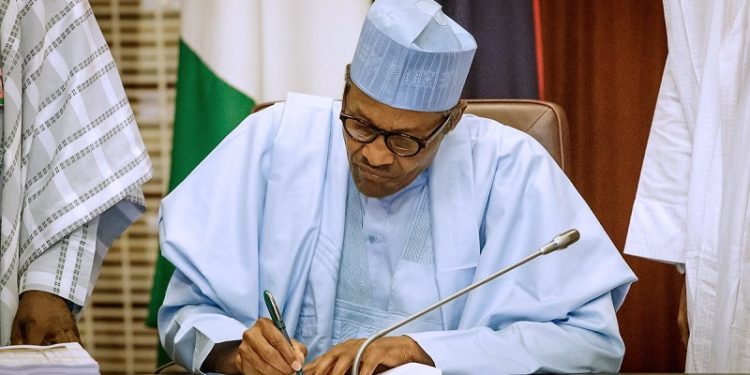Buhari signs Almajiri, Out-of-School children commission Bill into law
President Muhammadu Buhari has assented to the bill seeking to create a Commission to cater to Almajiri and out-of-school children to prevent destitution and exploitation. The Bill sponsored by Balarabe Shehu Kakale and 18 others is titled: “Bill for an Act to Establish National Commission for Almajiri Education and out of School Children to Provide […]

President Muhammadu Buhari
President Muhammadu Buhari has assented to the bill seeking to create a Commission to cater to Almajiri and out-of-school children to prevent destitution and exploitation.
The Bill sponsored by Balarabe Shehu Kakale and 18 others is titled: “Bill for an Act to Establish National Commission for Almajiri Education and out of School Children to Provide for a Multimodal System of Education to Tackle the Menace of Illiteracy, Develop Skill Acquisition and Entrepreneurship Programmes, Prevent Youth Poverty, Delinquency and Destitution in Nigeria; and for Related Matters (HB.2023),”
When established, according to the bill sponsors, the Commission will “be responsible for providing skills acquisition and entrepreneurship programmes development for children and teenagers through schools to reduce the rate of poverty, and lessen delinquency and destitution in Nigeria”.
Speaking to our reporter on Sunday, the lead sponsor of the Bill, Kakale (PDP, Sokoto), said the President signed the bill on Saturday as Nigerian children celebrate Children’s Day.
- Tinubu: Iconic, controversial kingmaker elected to renew Nigerians’ hope
- Remi Tinubu: We Don’t Need Nigeria’s Wealth To Survive
He described the passage of the Bill as a gift to Nigerian children.
“A special thank you to President Muhammadu Buhari for this outstanding, glorious, and once-in-generation parting gift to the millions of beautiful little children of Nigeria and beyond.
“Congratulations to all stakeholders and citizens for this extraordinary feat to ensure justice, equity and inclusiveness in education in Nigeria where no child whether Almajiri or not shall ever be left behind again”.
The bill faced stiff opposition from various sections and groups in the country since its introduction.
It, however, scaled through second and third readings, subjected to a public hearing and transmitted to the President for assent.
